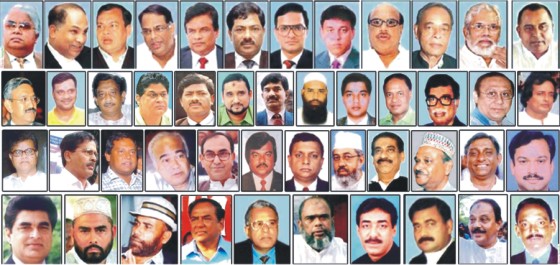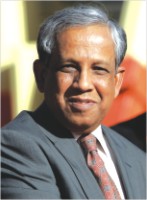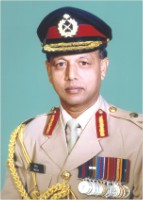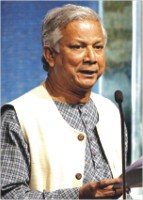
Inside
|
The end of corruption? The ultimate success of the current anti-corruption drive depends entirely on the make-up of the next parliament, argues Rehman Sobhan
The political life of the nation is currently caught in a twilight zone where the time lines for restoration of our democratic institutions appear to be indistinct. This is not a comfortable position either for the country or a caretaker government (CTG) committed to reforming and strengthening our democratic institutions. There is universal agreement that the democratic process was heading for an implosion originating in an imminent confrontation between two major political alliances. This owed, at that stage, largely to the hijacking of the institution of the CTG by the 4 party alliance and their attempt to impose a stage-managed election under the authority of the politically subordinated chief advisor. But behind that confrontation lay a protracted degeneration in our democratic institutions due to the increasingly confrontational nature of our politics. This had progressively undermined the efficacy of virtually every institutions of governance from parliament, to the bureaucracy, the law enforcement agencies and even the judiciary and now threatened to compromise the integrity of the armed forces. The presumption of the 4 party alliance that the armed forces would stand behind them in manipulating the general election scheduled for January 22 was built upon the assumption that they could be compromised in the same way that all other institutions had been made captive to the interests of the ruling alliance. Fortunately for the nation, this assumption turned out to be a political blunder of historic proportions. The BNP committed a similar act of folly in February 1996 when they went ahead with a one-sided election which eventually compelled them to spend 5 years on the opposition benches. That they should then repeat this folly 10 years later appears to be beyond belief. This time, the miscalculation may have a far greater cost for the BNP, in particular, because it has set in motion an existential crisis where the future of the party, in its present configuration, may be at stake. The question posed by me in my article in the January issue of Forum was whether the armed forces would invest their authority and prestige at the national and global level in forcing through an unrepresentative election. The answer, perhaps hardly surprising, was that the armed forces declined to bring discredit to their public image which could thereby compromise their corporate interests. Instead, they decided to compel the chief advisor to step down and hand over power to a new chief advisor heading a fresh CTG. They sensibly took this action before the nation was exposed to bloodshed so that the action of the armed forces actually brought a sense of relief to a beleaguered nation and was widely acclaimed, except perhaps within the precincts of Hawa Bhaban. The 14 party alliance, somewhat optimistically, believed that the new CTG would appoint a more credible Election Commission, clean up the partisan face of the administration and withdraw after holding elections within the next 3 months. Since the 4 party alliance would no longer be able to manipulate the election process, the 14 party alliance leadership believed that the consequential free and fair election would see them elected to power by April since the 4 party alliance, was by then, totally discredited. However, the powers behind the CTG appear to be in no hurry to proclaim elections which they apprehend may restore the status quo ante, however free and fair such elections may be. The question is when and under what conditions will elections take place. The agenda of the CTG appears to extend beyond ensuring the integrity of the Election Commission and the neutrality of the administration. The CTG's expanded agenda is designed for ensuring credible elections but this appears to require changes within the party's nomination procedures and conduct of elections which involve structural reforms relating to the institutions of democracy. The immediate program of the CTG to target corruption and neutralize criminal elements has obvious relevance for ensuring a better quality of candidates for contesting elections which need to be held in an environment where the role of money and muscle are neutralized. The CTG's immediate objective to hold to account those who used state power to accumulate wealth appears to now be a primary mission rather than just instrumental for ensuring a clean election. Any move to target corruption clearly commands universal support even where the immediate charges against particular people appears to be trivial in relation to the presumptions about the levels of wealth and corruption of those so charged. So widespread is the belief that corruption prevails at all levels of the state that few people appear to be unduly concerned about the sustainability of the charges brought against particular detainees. Such a public culture of presumed guilt may not be encouraging for these who attach a special value to the observation of the rule of law. But the juxtaposition of obscene displays of private wealth demonstrated by owners of Mercedes, Porsches, and private zoos and the unending media reports on malfeasant conduct in the process of public expenditure, appear adequate evidence for our citizens. Most people appear to be willing to hold their concern for due process in suspense till credible explanations for such accumulations of private wealth are provided by those so charged.
In such circumstances, moves by a non-partisan CTG to hold incumbents in successive regimes to account for corruption are viewed by the public as a near-revolutionary act. What is to be seen is whether such an initiative can be sustained or whether political opportunism will once again come into play in keeping selected political players outside the purview of the anti-corruption process followed by the progressive rehabilitation of some of those incarcerated for corruption. We may recollect that a number of politicians detained by H.M. Ershad for corruption, during the early phase of his Martial Law regime, ended up as members of his cabinet. If the assault on corruption is to be sustained, it will have to be applied without fear or favour and will have to strike at the roots of the problem. This article is not about how to eradicate corruption. But it is worth emphasizing that corruption is a structural problem originating in the break down of the system of governance where lack of transparency and accountability remain the order of the day. This crisis of governance derives from the malfunctioning of the democratic process where corruption has now become the life-blood of contemporary politics. Much if not all of the crores of taka used to finance an election campaign originate in such acts of corruption which feed the treasure trove of black money. Once elected and then patronized by a ruling party, state power can then be used to keep in motion an unending cycle of corruption built around the collusion of the ruling party, the rentier elite, the bureaucracy and the criminal classes, which has contributed to Bangladesh crisis of both democracy and governance. Given the structural nature of the corruption process it will not be enough to detain a few politicians and then hold an election where such people are temporarily disqualified from participation. The election process itself will have to be reconstructed and supervised in such a way that money cannot emerge as a variable in determining the outcome of an election in any constituency. This is a herculean task which will involve the Election Commission, the NBR, and the law enforcement agencies, all supported by the full weight of the administration as well as the vigilance of civil society. Such an holistic enterprise may possibly be conceived for the forthcoming election under the present CTG. If such indeed be the goal of the CTG then the present drive against corruption may be directly linked to the goal of holding a truly democratic election where people of modest means can expect to contest and even win an election. But can such a process of neutralizing the power of money be sustained over successive elections? This will greatly depend on the political forces which emerge victorious in the next election. If the election, however sanitized it may be from black money, restores one or other of the traditional political parties to power, can we ensure that the cycle of corruption, black money and malgovernance leading to democratic failure, will not be repeated? The question is certainly being asked within the CTG but particularly by the powers that back them. How they answer this question may determine not just the timing and trajectory of the electoral process but also the agenda of the powers that be. In seeking to answer this question, the CTG as well as the powers that be will have to fully comprehend the nature of the problem and decide how far and how deep they are willing to go in not just curbing corruption but addressing its systematic roots. It is arguable that the answer to this dilemma does not lie exclusively within the domain of the CTG or their backers whose capacity for making structural reforms may be limited unless they plan to be here for a long time. If we are serious about restoring democracy then the answer also lies in the hands of both the traditional and prospective political players. The traditional political players have to commit themselves to eradicating corruption through transforming the process of governance as we know it. In making such a commitment, the parties will have to decide whether they are willing and able to transform themselves into genuinely democratic institutions with transparent sources of funding, who will then commit themselves to strike at the roots of corruption when elected to office. If these parties were to do so this would indeed be a revolutionary development in our politics and would do much to restore faith in our democratic institutions.
If new entrants such as Yunus expect to be taken seriously by a public grown weary of the broken promises of the mainstream political players, they will have to prepare their public positions through a more consultative process. Party manifestos, crafted behind closed doors, are rarely taken seriously even within the political parties who craft them. Yunus would, therefore, be well advised to sit down with a broad range of constituencies, such as women's organizations, trade unions, peasant organizations, human rights activists, specialized organizations such as Transparency International, and ultimately the political parties who may be deemed by him to be broadly sympathetic to his own political agenda. He would need to draw on the experience and expertise of the civil society groups to share their assessment of the outstanding problems faced by people and particularly the most deprived segments and to elicit their views on how to address these problems. But he will also need to draw on his political fellow travelers to ascertain what parts of his agenda are politically saleable and where he can expect such parties to join hands with him in realizing shared policy agendas. He can use such encounters to share his own ideas on what needs to be done and to establish his credibility that he is not anyone's instrument but can be depended to carry forward an indigenously and democratically crafted policy agenda. Through such a process he can build his political platform and reach out to a broad cross section of concerned citizens to walk beside him on his political safari. A political party which draws its strength from the quality and credibility of its political platform would indeed be a novelty in contemporary Bangladesh, in the same way that Bangabandhu's commitment to Six-Points transformed Bangladesh politics in the 1960s. Through such a consultative process, Yunus will discover that eradicating corruption will be one of the premier challenges before him. His commitment in this area will be immediately demonstrated in the person of those who constitute his party organization and who will eventually be nominated from his party to contest elections.
The CTG should undoubtedly persist with their drive to make the corrupt accountable for their misdeeds. However they should recognize that striking at the sources of corruption will be a longer term affair involving structural reforms which will require more time and a strong political mandate. CTGs do not have such a mandate nor would it be in their interest to overstay their welcome. A more realistic goal for the CTG should therefore be to ensure that in the forthcoming election those with a record of corruption would be disbarred from contesting the election and the power of money and muscle will not be a factor in influencing the outcome of the election. Hopefully such a strategy, if sincerely and effectively carried out by the CTG and implemented by the Election Commission, will ensure the election of "clean" candidates to the next parliament. Such a new generation of parliamentarians may be expected to invest their support behind a regime which can set about eradicating corruption and transforming Bangladesh from one of the most corrupt to one of the less corrupt countries in the global community. The ultimate challenge to end corruption will thus become intimately linked to the outcome of the next election. Unless the election can bring to power new or regenerated political parties committed to honouring their promises to the electorate for sustaining democracy, revolutionizing the governance of the country, and sharing the fruits of development, the events leading up to 1/11 may yet again be repeated this time with more fatal consequences for our democratic process. Photos: Focus bangla, AFP, ISPR |

 To focus on targeting the corrupt is important in its own right. Hitherto, corruption appears to have passed unchallenged except when an incumbent ruling party sought to harass its opponents. The conspicuous reluctance of the ruling party to take cognizance of acts of corruption in its own ranks undermined the credibility of the attempts to take their predecessors to task for their misdeeds. All such anti-corruption initiatives by a regime were thus deemed by the public as partisan acts. The blatant politicization of the corruption cases against H.M. Ershad to secure his support for one or the other political alliance compromised the heroic efforts of the late Aminul Haque, the attorney general under the Shahabuddin CTG and the first BNP government, to hold the former president accountable for his corruption. It was not surprising that over successive regimes no case of corruption initiated against members of the preceding regime came to fruition. Indeed, the very word corruption, used indiscriminately during the last election campaign by the opposition and in the first years in office of the newly elected regime, disappeared from the vocabulary of the ruling party half way though their tenure in office.
To focus on targeting the corrupt is important in its own right. Hitherto, corruption appears to have passed unchallenged except when an incumbent ruling party sought to harass its opponents. The conspicuous reluctance of the ruling party to take cognizance of acts of corruption in its own ranks undermined the credibility of the attempts to take their predecessors to task for their misdeeds. All such anti-corruption initiatives by a regime were thus deemed by the public as partisan acts. The blatant politicization of the corruption cases against H.M. Ershad to secure his support for one or the other political alliance compromised the heroic efforts of the late Aminul Haque, the attorney general under the Shahabuddin CTG and the first BNP government, to hold the former president accountable for his corruption. It was not surprising that over successive regimes no case of corruption initiated against members of the preceding regime came to fruition. Indeed, the very word corruption, used indiscriminately during the last election campaign by the opposition and in the first years in office of the newly elected regime, disappeared from the vocabulary of the ruling party half way though their tenure in office. At the same time, new political forces which are appearing on the political stage, such as Nagorik Shakti, will have to give priority to defining their own position on how they will address the structural sources of corruption and go on to implement their commitments without fear or favour, if elected to office. Nagorik Shakti has yet to project its political agenda before the nation. Professor Yunus undoubtedly has views on how to address a variety of problems. He has even stated at a public dialogue held several years ago when the Anti-Corruption Commission was first set up, on how he would set about eradicating corruption. However, addresses at seminars on how to solve national problems is far removed from projecting your ideas onto a political platform where a leader automatically generates exceptions from the public. New political entrants such as Yunus are expected not just by the public but by their prospective party members, to declare where they stand not just on such issues as rooting out corruption but on other major issues of public concern such as poverty eradication, improved public services, etc.
At the same time, new political forces which are appearing on the political stage, such as Nagorik Shakti, will have to give priority to defining their own position on how they will address the structural sources of corruption and go on to implement their commitments without fear or favour, if elected to office. Nagorik Shakti has yet to project its political agenda before the nation. Professor Yunus undoubtedly has views on how to address a variety of problems. He has even stated at a public dialogue held several years ago when the Anti-Corruption Commission was first set up, on how he would set about eradicating corruption. However, addresses at seminars on how to solve national problems is far removed from projecting your ideas onto a political platform where a leader automatically generates exceptions from the public. New political entrants such as Yunus are expected not just by the public but by their prospective party members, to declare where they stand not just on such issues as rooting out corruption but on other major issues of public concern such as poverty eradication, improved public services, etc.  If such "clean" candidates, many if not most of whom may not be particularly wealthy people, are to contest elections, they will need a level playing field where the power of money and muscle will have been neutralized. It is here that the agenda of the CTG to attack corruption will become congruent with the interests of those parties and candidates who need to neutralize the power of money in the next election. It will not be enough for such a party to contest a one-off election where money power is not to be a variable. If elected to office this party will have to build a political consensus derived from its electoral victory, to strike at the roots of corruption. It is only through securing such a democratic mandate that we may expect that black money will no longer be a lubricant for the electoral process and will cease to serve as a primary motivation for participation in politics.
If such "clean" candidates, many if not most of whom may not be particularly wealthy people, are to contest elections, they will need a level playing field where the power of money and muscle will have been neutralized. It is here that the agenda of the CTG to attack corruption will become congruent with the interests of those parties and candidates who need to neutralize the power of money in the next election. It will not be enough for such a party to contest a one-off election where money power is not to be a variable. If elected to office this party will have to build a political consensus derived from its electoral victory, to strike at the roots of corruption. It is only through securing such a democratic mandate that we may expect that black money will no longer be a lubricant for the electoral process and will cease to serve as a primary motivation for participation in politics.